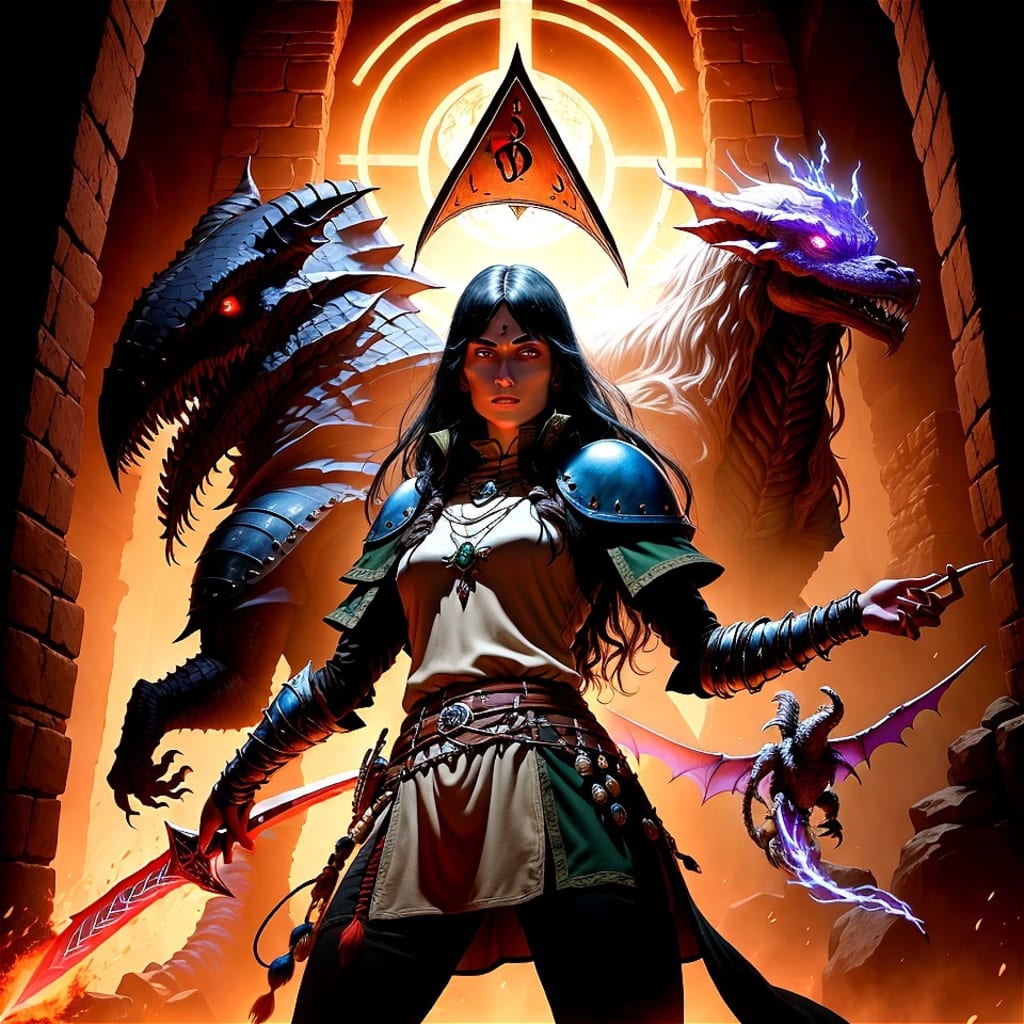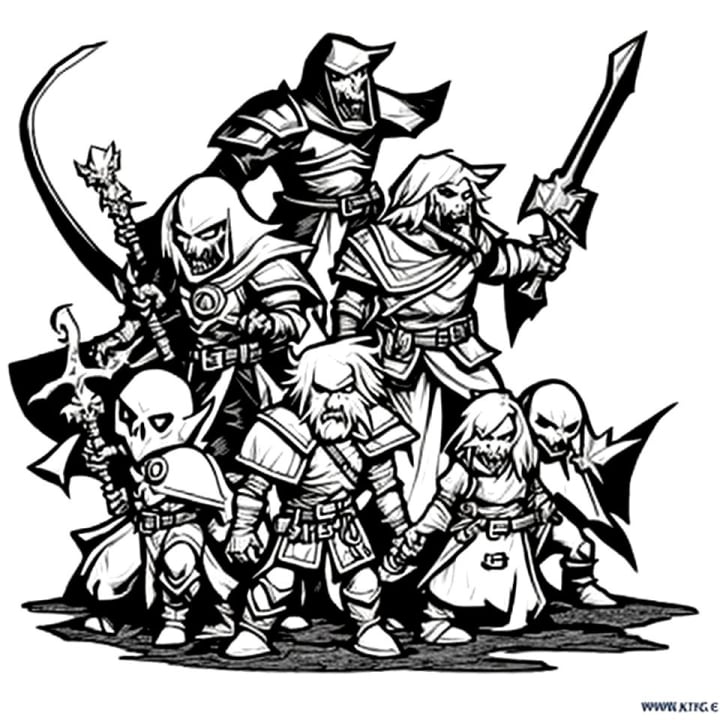
In this section, we'll go over the rules of combat (one possible way to do it, at least), and also provide all the tables necessary to roll up random results when in doubt, or the Oracle suggests it.
To go to section one of this online rulebook, click below.
Part 1 of Castles and Caverns: Solo Tabletop Roleplaying Game

Combat!
In Castles and Caverns, combat is determined, or at least, can be determined, in one of several ways. You can roll 3d6, and add the character's strength bonus, and that will be the character's AC, or "Armor Class." An NPC or opponent will attempt to roll OVER this number, using a D20, applying the relevant modifier, such as his or her strength modifier. If they roll your AC number or above, they "hit." If they roll over by MORE THAN HALF, they Critically Hit the opponent. The PC or NPC will have to roll a Save in that case on a 1d6. Odd numbers they live, even numbers they DIE. In any case, rolling under their DC (Defense Score) will lessen the damage by half, including whatever armor they are carrying as modifiers (-1 or 2 to dmg). They subtract the final tally from their Hit Points (3d6 plus ten divided by two, round down).
Modifiers can be added for Ranged Weapons, such as a crossbow, with a 1d4 roll denoting 1 as a short distance (within 6 feet, roll 1d6 for exact distance), 2 as a medium distance (roll a d10), three as a long distance (roll a d20), and four as a long distance (roll a d100). In an open plain or field, or in the forest, a d8 roll can determine direction if it is unknown, with the one taking the place of North, two as Northeast, three as East, four as Southeast, five as South, six as Southwest, seven as West, and eight as Northwest. This is assuming you aren't in a dungeon or enclosed space wherein such considerations are self-explanatory. Note again, these things are all optional. Combat can be handled in as simple a way as you desire, with a roll of the Oracle (Do I win the battle? Yes? No?) or simply by deciding who wins or what happens by what "feels right" as regards the story, as you journal it. In Castles and Caverns, rules are made to be broken, can be utilized as necessary, or discarded as necessary. As a solo player especially, it is entirely up to YOU.
Tables
Note: Unless otherwise noted, the number of XP for each find is equal to a roll of the same dice used to roll the table.
- Roll |Weapon | Type | Damage
- 1-5 | Short Sword | Melee | Dmg. 1d6
- 6-9 | Longbow | Ranged | Dmg. 1d8
- 10-12 | Warhammer | Melee | Dmg. 1d10
- 13-15 | Dagger | Melee | Dmg. 1d4
- 16-18 | Crossbow | Ranged | Dmg. 1d8
- 19 | Greatsword| Melee | Dmg. 2d6
- 20 | Magical Staff | Versatile | Dmg. 1d12+1
Weapons Table (d20 Roll)
Treasure Table (d20 Roll)
Roll | Treasure Type
- 1-5 | Gold Coins (1d10x10) Each coin worth 1d6 XP
- 6-9 | Gemstone \ 1d10x10 XP
- 10-12 | Artwork \ 10 XP
- 13-15 | Magical Scroll \ 1 Spell \ 1d10 XP
- 16-18 | Enchanted Weapon \ 4d6 dmg \ 1d6 XP
- 19 | Potion of Healing \ heals 1d6 hp \ 1d6 XP
- 20 | Rare Artifact \ To be determined \ 1d6 XP
Potion Table (d10 Roll)
Note: Consult the Oracle for specifics and duration of the potion.
- Roll | Potion Type
- 4-5 | Invisibility: Invisibility potions typically make the person who drinks them invisible for a certain duration. The duration can vary, but it's often for a limited period, such as just a few minutes. This allows the user to move undetected by others.
- 6-7 | Strength: Strength potions enhance the physical strength of the person who consumes them. The duration can vary, but it's typically for a limited time, such as a few minutes. This increased strength can be beneficial in combat or for performing tasks that require physical prowess.
- 8 | Speed: Speed potions enhance the speed and agility of the person who drinks them. Like other potions, the duration can vary, but it's often for a limited period. Increased speed can be useful for quickly traversing areas or evading enemies.
- 9 | Intellect: Intellect potions likely boost cognitive abilities, such as intelligence and problem-solving skills. The duration can vary, but it's usually for a limited time. These potions might be useful in situations that require mental acuity, such as solving puzzles or outsmarting opponents.
- 10 | Polymorph: Polymorph potions typically transform the person who drinks them into a different form or creature. This potion can be used for various purposes, such as avoiding danger or gaining specific abilities associated with the new form.
Spell Table (d20 Roll)
Roll | Spell |Name |Description
- 1-5 | Fireball | Deals 2d6 fire damage in a 20-ft radius
- 6-9 | Invisibility | Renders the caster invisible for 1 hour (six turns)
- 10-12 | Teleportation | Teleports the caster to a known location
- 13-15 | Frost Nova | Freezes enemies within 15 feet, 1d8 damage
- 16-18 | Healing Wave | Heals all allies in a 30-ft radius, 2d4+2
- 19 | Lightning Bolt | Strikes a single target for 3d10 lightning
- 20 | Summon Elemental | Summons an elemental ally to aid in combat
NPC Table (d10 Roll)
Roll | NPC Type | Strength |Intelligence | Charm |Fortitude |Damage
- 1-3 | Town Guard | St. 7 |Int. 4 |Char. 5 | Fort. 6 |Dmg. 1d6
- 4-6 | Wise Mage | St. 3 | Int. 9 | Char. 7 | Fort. 5 | Dmg. 1d8
- 7-8 | Charismatic Thief | St. 5| Int. 6 | Char. 9 | Fort. 4 | Dmg. 1d4
- 9 | Elite Knight | St. 8 | Int. 3 | Char. 4 | Fort.7 | Dmg. 1d10
- 10 | Enigmatic Scholar | St. 4 | Int. 8 | Char. 6 | Fort. 8 | Dmg. 1d6

Monster Table (d10 roll)
Roll |Monster | Type | Strength | Intelligence | Charm | Fortitude Damage
- 1-3 | Goblin | St. 4 | Int. 2 | Charm. 2 | Fort. 5 | Dmg. 1d4
- 4-6 | Dire Wolf | St. 7 | Int. 2 | Charm.3 | Fort. 6 | Dmg. 1d8
- 7-8 | Giant Spider | St. 6 | Int. 3 | Charm. 1 | Fort. 4 | Dmg. 1d6
- 9 | Chimera | St. 8 | Int. 6 | Charm. 7 | Fort. 9 | Dmg. 2d8
- 10 | Dragon | St. 10 | Int. 8 | Charm. 10 | Fort. 10 | Dmg. 3d10
Random Dungeon Generator (d10 roll or draw three cards) Note: The suit of the card with the highest value will determine what sort of treasure (weapons for spades, spells for clubs, treasure for diamonds, hearts for potions, might be in the room. Roll against the appropriate table.)
Room Shape:
- 1-4: Square
- 5-7: Rectangular
- 8-10: Circular
Room Size:
- 1-3: Small
- 4-7: Medium
- 8-10: Large
Doorways:
- 1-5: Single doorway
- 6-8: Double doorways
- 9-10: Hidden doorway
Extended Monster Table (d10 Roll)
Roll | Monster Type | Strength | Intelligence | Charm | Fortitude Damage
- 1-2 | Orc |Str. 6 | Int. 3 | Charm. 2 | Fort. 7 | Dmg. 1d8
- 3-4 | Vampire | Str. 8 | Int. 9 | Charm. 7 | Fort. 8 | Dmg. 2d6
- 5 | Lycanthrope | Str. 7 | Int. 4 | Charm. 3 | Fort. 6 | Dmg. 1d10
- 6 | Ghost | Str. 4| Int. 7 | Charm. 8 | Fort. 5 | Dmg. 1d6
- 7 | Troll | Str. 10 | Int. 2 | Charm. 1 | Fort. 9 | Dmg. 2d8
- 8 | Giant Rat | Str. 5 | Int. 1 | Charm. 1 | Fort. 4 | Dmg. 1d4
- 9 | Giant Bat | Str. 3 | Int. 2 | Charm. 1 | Fort. 5 | Dmg. 1d6
- 10 | Undead Zombie | Str. 6 | Charm. 1 | Fort. 7 | Dmg. 1d8
Special Monster
- Strength: 9
- Intelligence: 2
- Charm: 1
- Fortitude: 8
- Damage: 2d10
Flesh Golem
Good Events Table. (Pulling a King face card) Note: Consult Oracle for specifics. Example: "Is my weapon an extra dice roll modifier?" Make sure though, that you keep within the logic of the story as it is unfolding:
Roll | Event | Effect
- 1 | Hidden Alcove with Healing Herbs | Find a stash of herbs that can heal wounds
- 2 | Encounter with a Friendly Spirit | A benevolent spirit offers guidance or aid
- 3 | Forgotten Library Nook | Discover a dusty library with forgotten magical scrolls
- 4 | Safe Resting Spot Behind a False Wall | A concealed area provides a secure place for a short rest
- 5 | Temporary Enchantment on Weapons | Weapons gain a magical enhancement for a limited time
- 6 | Discover a Hidden Shortcut | Uncover a secret passage, making progress easier
Unforeseen Events Table (Pulling a Jack)
Roll | Event | Effect
- 1 | Ceiling Collapse | A section of the ceiling caves in, requiring quick reflexes
- 2 | Foul Odor | Release of foul stench, requiring the use of protective measures
- 3 | Disturbing Altar | Encounter an unsettling altar with unknown consequences
- 4 | Collapsed pathway | A pathway crumbles, hindering movement across a chasm
- 5 | Maze-like Chamber | Get lost in a complex series of interconnected passages
- 6 | Distorted Reality in a Magical Chamber | Reality warps, affecting perception and navigation
Very Strange, Bad Events Table (Pulling an Ace)
Roll | Event |Effect
- 1 | Unleashed Spirit Guardians |Disturbance releases spectral guardians, requiring negotiation
- 2 | Cursed Treasure Chest | Open a chest that curses those who attempt to claim its contents
- 3 | Magical Echoes Resonate | Unpredictable magical echoes disturb spellcasting and communication
- 4 | Shadowy Figures Lurking | Encounter mysterious figures with unclear intentions
- 5 | Glyph-Protected Chamber | Accidentally trigger magical glyphs, facing unforeseen consequences
- 6 | Ancient Guardian's Awakening | Disturb an ancient guardian, initiating a challenging encounter
Understand: Even if you pick a certain suit of card, you aren't required to roll against any table, and can decide what the Good, Unforeseen, or Bad Event is based purely on your imagination or what, again, "feels right" as regards the story developing. Or you can ask the Oracle, "Is it a monster? A wanderer? Treasure in the corner of the room?" etc. EVERYTHING here is just a tool to aid you in your adventure and roleplaying, in developing the story as the sole player (if playing alone).
Conversely, if something doesn't feel right", such as a roll against a table, simply roll again, or dismiss it. Always go with what seems best to YOU. The dice and tables are just there as tools.
Process of Play
The process of play for a solo TTRPG is self-defined and very open. it usually involves journaling the answers given to a response from an Oracle. This is usually in the form of a simple Yes / No question, but it can also involve three modifiers (or more), such as "yes," "but," and "because." The example below is an expanded Oracle you can roll against with the added modifiers. Roll a d6.
Expanded Oracle
- 1 | Emphatically no!
- 2 | No.
- 3 | No, however...
- 4 | Yes.
- 5 | Yes, because...
- 6 | Emphatically yes!
After receiving your answer, interpret it. Remember: You are both the player AND the GM. So whatever comes out of your head and into the journal, based on interpreting the answers. If the answer is, yes to "Do we find anything in the room?" you either decide what type of thing you find (treasure, armor, etc.), or choose a card and go with whatever suit you choose, rolling against that table. For example, if you get the Oracle an answer that indicates you should roll against weapons, roll the Weapons Table and go with the answer. You could just as easily pick a card, or even three, and go with the suit of the highest valued card you pull (spades, clubs, hearts, diamonds). You could even pull one card and use the value of the card to determine how many items are in the room.
A 1d4 roll will give you an idea of terrain when traversing open, marshy, or rocky ground. One being rough, two being very rough, three being extremely rough (weeds, stones, marshy mud, or sandy pits), and four being nearly impossible.
In between Oracle questions, rolling on random tables, or card pulls, you use the journaling to "fill in the blanks" with what occurs to your imagination, or "seems right" as regards the story. You can choose an overarching plot and "set the scene" based on rolling against the Table of Prompts and the Setting the Scene tables, and even introduce a Plot Twist and start asking the Oracle questions, and journaling. But if you want to do a style of play very much loose, primitive, and based only on prompts or your imagination and oracle questions of a single dice roll, that is up to You. Everything here is a tool for your imagination, to use or discard as you see fit, or as the story demands.
Plot Prompts.
Roll | Prompt
- 1 | A mysterious figure offers a cryptic prophecy
- 2 | The party stumbles upon an ancient, rune-covered door
- 3 | A pack of dire wolves surrounds the adventurers
- 4 | A merchant claims to possess a map to hidden treasure
- 5 | The party encounters a band of wandering minstrels
- 6 | A magical artifact is spotted in a shop's window display
- 7 | A forgotten temple emerges from the thick mist
- 8 | The party is hired to investigate a series of disappearances
- 9 | An old beggar reveals surprising knowledge about the party
- 10 | A rival group of adventurers challenges the party to a contest
- 11 | The party witnesses the arrival of a comet with mystical properties
- 12 | A sudden earthquake reveals a hidden entrance to an underground cavern
- 13 | A celestial being descends, seeking assistance from the party
- 14 | The local lord offers a generous reward for the defeat of a monstrous threat
- 15 | A magical portal opens, offering a glimpse into another realm
- 16 | A cursed object is rumored to bring both fortune and misfortune
- 17 | A cloaked figure warns of an impending demonic invasion
- 18 | The party finds an ancient grimoire with forbidden spells
- 19 | A wise sage seeks the party's help to recover stolen knowledge
- 20 | A ghostly apparition beckons the party toward an ancient burial site
Setting the Scene (Roll 1d10):
Roll | Scene Description
- 1 | The air is thick with mist, obscuring vision in all directions
- 2 | A bustling market square, filled with merchants and exotic goods
- 3 | A dense, ancient forest with towering trees and hidden secrets
- 4 | A desolate and haunted graveyard, where shadows move on their own
- 5 | An opulent, otherworldly palace surrounded by a magical aura
- 6 | A rocky mountain pass, with treacherous terrain and ominous echoes
- 7 | A quaint village celebrating a festival, but something feels amiss
- 8 | A network of underground tunnels, home to mysterious creatures
- 9 | A mystical oasis in the midst of a scorching desert
- 10 | An abandoned castle, its towers silhouetted against a blood-red sunset
Plot Twists (Roll 1d12):
Roll | Plot Twist
- 1 | A trusted ally is revealed to be a disguised enemy
- 2 | The quest item the party seeks has already been stolen
- 3 | The party is accused of a crime they did not commit
- 4 | A powerful artifact the party possesses starts to corrupt them
- 5 | The quest was a diversion; a greater threat looms on the horizon
- 6 | The villain turns out to be a puppet, manipulated by a more sinister force
- 7 | A forgotten prophecy reveals a shocking truth about one of the party members
- 8 | The party's actions unwittingly awaken an ancient, malevolent being
- 9 | The party discovers a hidden society with its own agenda
- 10 | The seemingly benevolent quest giver is the true antagonist
- 11 | The party learns that they are key players in a cosmic struggle
- 12 | A trusted NPC reveals that they are from the future with a dire warning
Next: A Sample Solo "Engine" and a Sample Adventure!
About the Creator
Tom Baker
Author of Haunted Indianapolis, Indiana Ghost Folklore, Midwest Maniacs, Midwest UFOs and Beyond, Scary Urban Legends, 50 Famous Fables and Folk Tales, and Notorious Crimes of the Upper Midwest.: http://tombakerbooks.weebly.com






Comments (1)
Continues well & most intriguingly.